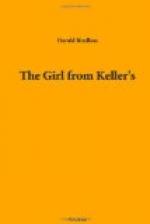The foreman retired, muttering, but not towards the bridge, and Festing looked hard at Charnock.
“I was anxious for a moment,” Charnock admitted. “But I didn’t think he’d go. For one thing, I knew he knows Norton doesn’t like him.”
“Then I’ll leave you to deal with Norton if he hears about the matter. Now you have had your amusement, we had better get on.”
The short rest and laughter had refreshed the gang and they made good progress. As the holes between the frames deepened, the work got harder and the footing bad, because they were forced to stand on slippery ledges while they passed the heavy stones from man to man. Charnock was ready with jocular sympathy if one fell or a stone bruised somebody’s hand, and his jokes spurred on the weary. It got dark soon in the hollow, but as the light faded the flame of a powerful blast-lamp sprang up and threw out a dazzling glare. The lamp belonged to the company, and Festing did not ask Charnock how he had got it. Bob had his own methods, and it was better to leave him alone. When the whistle blew, the latter turned to the borrowed men.
“Go to our shack, boys, and get supper there. I told the cook to fix up something extra, and dare say you’ll find it better hash than yours. I’d like you to come back to-morrow, but am afraid it’s risky.”
CHAPTER XXIV
THE CHINOOK WIND
The frost got more rigorous, drying the snow to a dusty powder in which Festing’s lumber gang floundered awkwardly. Had there been a thaw, the surface would have hardened, but now they were forced to move the logs through loose, billowy drifts. The men sank to their knees, it was difficult to find a fulcrum for the handspikes, and the logs would not run well on the beaten roads. The latter broke into holes, and the dry snow retarded the smooth sliding of the lumber like dust. One could not touch a saw or ax-head with the naked hand.
Festing had seen that he might be embarrassed by hard frost, but had not expected it to continue. On the central tablelands of British Columbia winter is severe, but near the coast and in valleys open to the West the mitigating warmth of the Pacific is often felt. He had imagined that when his work upon the track was hindered the snow would help him to bring down lumber ready for use when a thaw set in. Now, however, wages were mounting up and little work was being done. He began to wonder what would happen if a change did not come.
One morning he knelt in a hole below the track, holding a drill. He wore mittens, but the back of one was split and showed a raw bruise on his skin. It needs practise to hit the end of a drill squarely, and Charnock, who swung the big hammer, had missed. The worst was that the bruise would not heal while the temperature kept low. They were sinking a hole through frozen gravel that was worse to cut than rock, because the drill jambed in the crevices and would not turn. But for the frost, they need not have used the tool; a hole for the post they meant to put in could have been made with a shovel, without using expensive powder.




